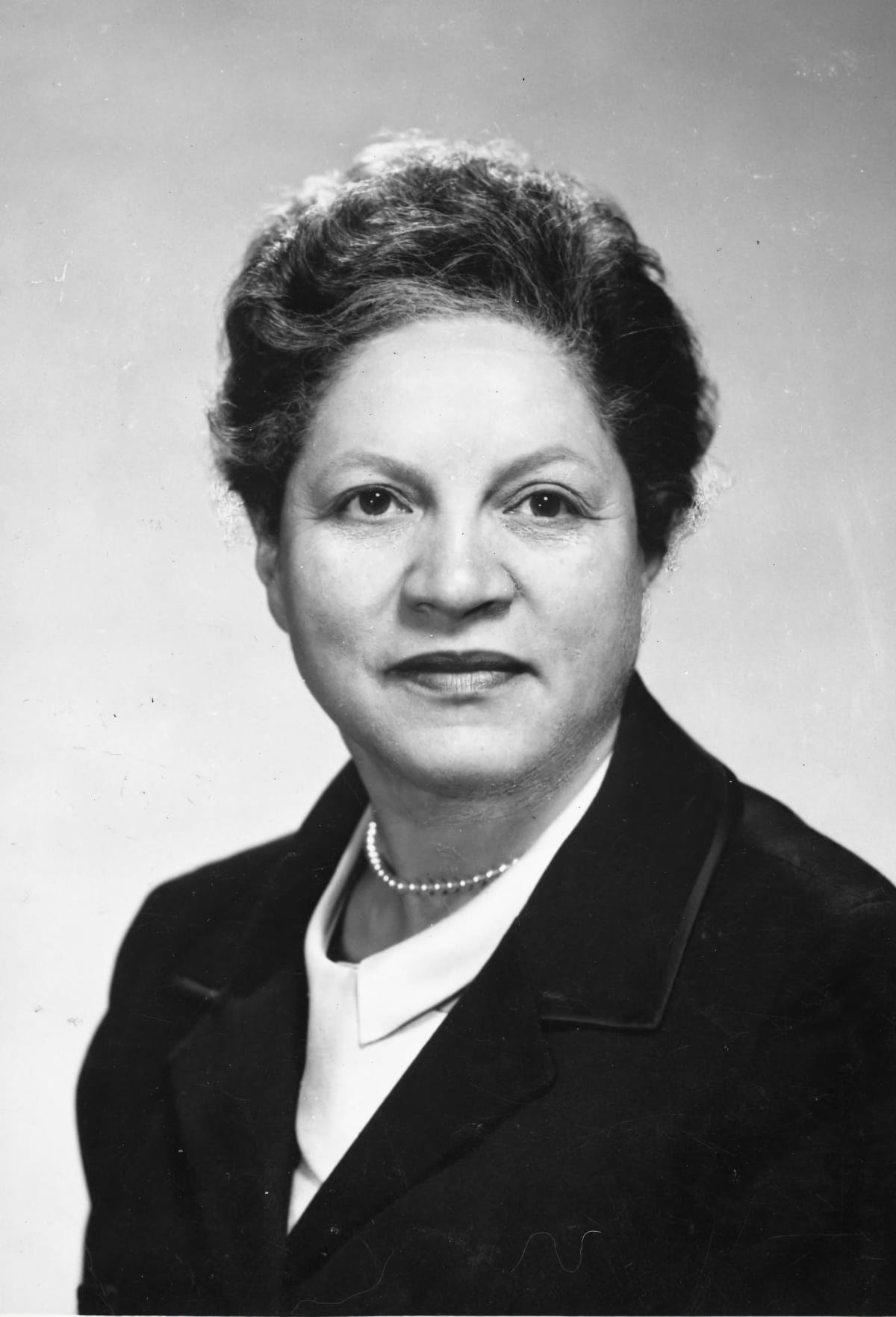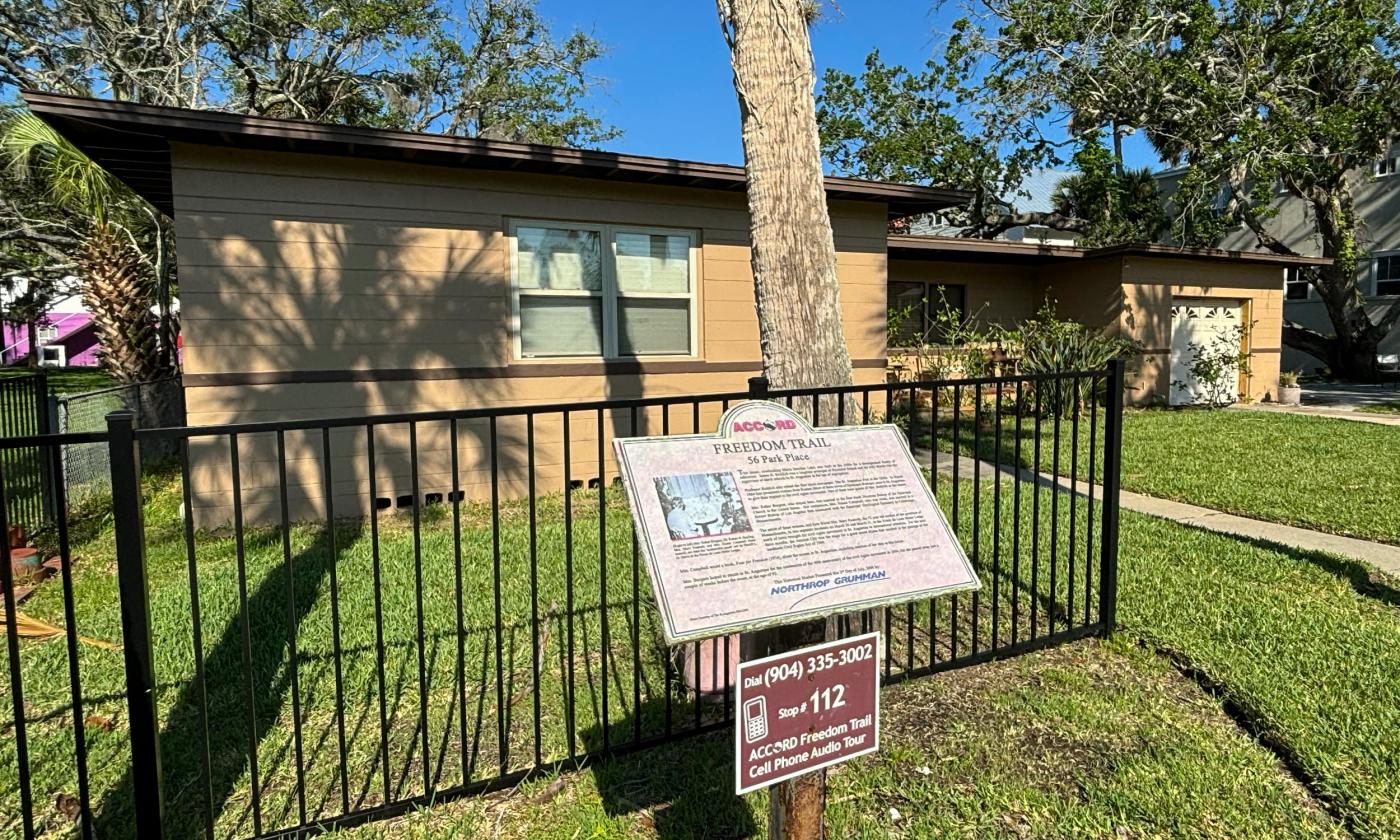56 Park Place
56 Park Place
Mrs. Maude Reddick
Mrs. Maude Reddick of 56 Park Place was a dedicated educator and involved citizen.
In the Jim Crow Era (1877-1964), before the passing of the 1964 Civil Rights Act, America's public schools were racially segregated. This was the case in St. Johns County, where White and Black school districts mostly functioned separately.
Along with her early years as a teacher and her later civil rights activism, Mrs. Reddick also served as the Supervisor of St. Augustine’s Black schools.
In 2005, Mrs.Maude Reddick was recognized by the Hastings Town Commission through a declaration of her exemplary service. Her granddaughter accepted the declaration, saying:
"My grandmother would have been very moved by your recognition, and so am I. We appreciate this acknowledgment of her work on behalf of all the students in St. Johns County." — Mrs. Karen Coffey
Mr. James G. Reddick
Professor James G. Reddick was a prominent academic and businessman in St. Augustine. Along with Mr. Frank Butler and Dr. Robert E. Smith, he was a founding partner of the Service Realty and Investment Agency in 1924.
Through this real estate business, Reddick assisted Butler in the early development of the West Augustine community.
In the 1930s, Reddick worked as an editor for The St. Augustine Post, the city’s first Black-owned newspaper.
As an educator, Mr. Reddick also served as the principal of Excelsior High School (now the site of the Lincolnville Museum and Cultural Center) for several years.
According to the St. Augustine Genealogical Society, Mr. James G. Reddick passed away on February 7, 1957.
The St. Augustine Civil Rights Movement (1951-1968)
By 1964, the efforts of local Black citizens to secure their civil rights had been ongoing in St. Augustine for over a decade.
That spring, summons by local activists led to a collaboration with Dr. Martin Luther King Jr.'s Southern Christian Leadership Conference (SCLC). Dr. King's presence here earned national attention.
The events of the St. Augustine Movement are recognized as being pivotal to the passing of the 1964 Civil Rights Act.
1964: Activists Flock to St. Augustine
In response to the violence in St. Augustine and the calls from Dr. King and other leaders, several groups of activists (many of them being clergy of multiple faiths) traveled here to join the demonstrations.
These "out-of-towners" usually stayed at the homes of local activists in the Lincolnville and West Augustine communities.
Four ladies of faith from Boston, Massachusetts, were among the visiting activists who made an impact. Three of these women were married to Episcopal Bishops, and one (Mrs. Mary Parkman Peabody, 72) was the mother of Massachusetts' governor.
This group of brave women used their status as elite members of northern society to bring attention to the struggle of St. Augustine’s African American community.
During the final week of March 1964, the SCLC directed the elite Bostonians to attempt to integrate local businesses by entering alongside Black activists and requesting service.
At first, they were told to politely leave when requested to do so. However, upon witnessing the extreme racism in St. Augustine, the visiting ladies decided they should be arrested alongside the local activists.
On March 30 & 31, they entered the Ponce de Leon Motor Lodge with Dr. R.B. Hayling and requested service. They were arrested on the second day and served time in the crowded St. Johns County Jail. This incident made national news and spurred many more civil rights demonstrations in St. Augustine.
Guests at 56 Park Place
Two of these Bostonians stayed at 56 Park Place with Mrs. Maude Reddick — Mrs. Esther Burgess, and Mrs. Hester Campbell.
Mrs. Esther Taylor Burgess

An active member of Boston's Episcopal community, Esther T. Burgess was a government worker and mother.
Mrs. Burgess' husband, Bishop John Burgess, was the first Black man to become a Diocesan Bishop of the Episcopal Church in the United States.
Despite her pale complexion often causing her to go "under the radar" and be treated as a White American, Mrs. Esther Burgess was a Black woman (who gladly identified herself as such). On one instance in St. Augustine, the Bostonian group had to point out to their waitress that there was an African American person in their party.
After her time here, Mrs. Esther T. Burgess continued as a lifelong advocate for Civil Rights — both for the African American community and for America's migrant workers. She passed away in 2004, mere weeks before the 40th anniversary of the 1964 Civil Rights Act.
Mrs. Hester Hocking Campbell
Hester H. Campbell was a dedicated Civil Rights activist. On August 28, 1963, she attended the infamous March on Washington for Jobs and Freedom. She was married to Donald J. Campbell, who served as dean at the Episcopal Theological Seminary in Cambridge, Massachusetts.
Less than a week after her return to Massachusetts in 1964, Mrs. Campbell read an account of her experiences called "Our Visit to St. Augustine." A re-print of her letter can be accessed through Flagler College's Civil Rights Library.
In 1974, Mrs. Hester H. Campbell published Four for Freedom, an autobiographical account of the Boston ladies' time in St. Augustine. The book shares her memories of their time in St. Augustine and work as activists.
Visiting the ACCORD Freedom Trail
Launched in 2007, the ACCORD Freedom Trail pays tribute to the activists and leaders (or "heroes and sheroes") of the St. Augustine Civil Rights Movement. The ACCORD Civil Rights Museum is the central location on the Freedom Trail.
Visit the ACCORD Freedom Trail Website to learn more.
Resources
Tap the blue underlined text to view the following online resources.
Online Resources
56 Park Place Historical Marker, from the ACCORD Freedom Trail website.
"NANCY QUATRANO: Hastings honors pair of homegrown notables," 2016 article from The St. Augustine Record, by Nancy Quatrano.
"The Courage of Her Convictions: Hester Hocking Campbell, Class of 1924," article from the 2021-2022 issue of Shady Hill School Magazine, by Betsy Ginsberg.
"Our Visit to St. Augustine," address by Hester H. Campbell, courtesy of the Civil Rights Library of St. Augustine (maintained by Flagler College).
"Prominent Newtonians: Esther Taylor Burgess," profile from Historic Newton.
Further Reading
Frank B. Butler: Lincolnville Businessman and Founder of St. Augustine, Florida's Historic Black Beach, by Barbara Walch, 1992.
St. Augustine, Florida, 1963-1964: Mass Protest and Racial Violence, edited by David Garrow, 1989.
The Dark Before Dawn: From Civil Wrongs to Civil Light, by Gerald Eubanks, 2012.


